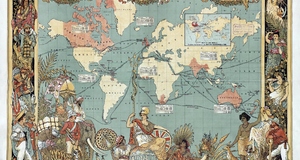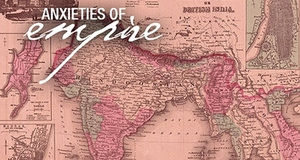From Interstate - Journal of International Affairs VOL. 2015/2016 NO. 3How Important is the Notion of the 'Civilising Mission' to Our Understanding of British Imperialism Before 1939?
By
Interstate - Journal of International Affairs 2016, Vol. 2015/2016 No. 3 | pg. 1/1
IN THIS ARTICLE
KEYWORDS
The ‘civilising mission' is a broad ideology that combines four main ideals; Enlightenment ideals, Christian / Evangelical ideas of pre-destination, racist ideas about white superiority and Liberalism. All these ideals have had a significant role in our understanding of British imperialism before 1939. Due to the limitations of this essay, I will focus on two of the most relevant and important aspects of the ‘civilising mission': racism and Liberalism. This essay proceeds in three parts. The first section demonstrates how important racism was in influencing the understanding of British Imperialism by focusing on how the example of Africans substantiates the claim made about the perception that "whites are more superior than others". In a following section, Liberalism will be the focal point of discussion. It is true that Liberalism was supposed to be absent as a tool of empire due to its widely believed presumptions emancipation not colonisation, liberation not servitude, and equality not double standards (Bentley, 2001:619). However, in this essay, I will argue otherwise: how Liberalism had been used as a handmaiden of British Imperialism. In short, this essay will argue that the‘civilising mission' in the aspects of racism and Liberalism are very important to the understanding of British Imperialism before 1939. The Importance of Race in the ‘Civilising Mission' and How It Shaped the Understanding of British ImperialismRace is the fulcrum of the ‘civilising mission' and inextricably intertwined with the understanding of Imperialism in terms of it being the major incentive of Imperialism. To be more precise, race has both biological and social connotative meanings.1 There are many ways to differentiate groups of people. Thus, race is "one form of categorisation".2 Race, in other words, is a self-enforcing interpretation which is entrenched in society as being "a natural part of a social world".3 The characteristics of race can be seen from having been united by common descent and identified by skin colour.4 What is commonly seen among the same group of people are their common bounds of practice in terms of "shared language, history, culture or outlook".5 Undeniably, from the Western perspective, non-Europeans were perceived as the "the others" which, in turn, led to emotional attitudes: "difference means inferiority".6 The idea of race was a widely held axiom that it was a biological proof of difference but is abhorred and rejected in the 21st century.7 Later on, in the 19th century, race had developed as a tool of social science to indicate not only a variety of characteristics and types, but also levels of development.8 In essence, racism is a belief that denotes the superiority of some races over others, meaning that the inferior races need to be treated with different standards; be it "the temperamental qualities, intelligence, capacity for work and the ability to create a valuable culture".9 In addition, by the late 19th century, it became evident that Europeans, especially Aryans, were superior.10 They were perceived as an exemplary recognition of beauty, intelligence, physical strength, moral integrity and bravery. However, any other groups who were bereft of this civilisation as a consequence of cultural stagnation and development were regarded as savage. Equally important, as Johnson argues, "Black skin was ‘evidence' of being a ‘human fossil' or ‘infantile'. The absence of literature or technology was seen as evidence of ignorance. Rebellion or resistance to white rule, and therefore to civilisation, was used as proof of underdevelopment, impulsiveness and immaturity."11 The epitome of stereotyping of Africans countenances the aforementioned claim in which the Africans were treated differently due to the accusation of having no history and culture, judging by their unpalatable practices such as human sacrifice and cannibalism, "politically decentralised, living in small villages, often naked, dominated by witchcraft, living in terror of their neighbours".12 The ‘civilising mission' as in the aspect of race is crucially important, and is of great relevance to the understanding of Imperialism in illuminating the true reason behind the invention of the term "race". The factors that contributed to racism can be varied: from economic reasons to finding and controlling an underclass of slave labourers.13 From this, it follows that the ultimate goal of imperialism in using racism as a reason to intervene is not about racial domination per se, but geopolitical security or commercial profit.14 Hence, the purpose of racist states is ethnic survival as they feel insecure because of an alien other.15 As a result, settler communities were prone to be more paranoid to the point that their racial prejudice is more prominent than that of politicians and officials in London owing to the fact that settlers were in closer contact with other races.16 Simply put, insecurity and fear were the true reason behind settler racial prejudice. The Importance of Liberalism in the ‘Civilising Mission' and How It Shaped the Understanding of British ImperialismThe schism of the definitions of Liberalism has always been at odds as to whether Imperialism had been buttressed or undermined by Liberalism.17 However, it is undeniable that Liberalism is the mainstay of the zenith of Imperialism according literally to the term "Liberal Imperialism", founded on assumed universal values, which focuses on insisting upon the enforcement of the rule of law and progress.18 More specifically, the emphasis of rationality and autonomy which the Liberal ideas uphold contradicts with nearly all the principles of empire.19 As such, it was by no means the underpinning tool of Imperialism.20 Besides this, in most periods in the early 18th and 19th centuries, Liberalism was more inclined to have been embodied with Imperialism.21 The justification for empire given in the 19th century was mainly the need for patience to realise a future in which the notion of future is expressed through the commitment to progress.22 Surprisingly, Liberal justification of the empire had been put forward and elaborated by all the great thinkers who were considered as democratic, be it John Stuart Mill, Jeremy Bentham, or Thomas Babington Macaulay. The essential legitimacy of the empire is the need to reconstruct political and commercial governance even though the means to do so was undemocratic, and representative structure was abstained.23 What these philosophers all agreed upon is the recognition of Britain, as a parent, obliged to be benevolent towards India, who was considered as a child, in bestowing civilisation.24 This idea of parental duty can be traced back from Liberal tradition which was "Locke's characterisation of tutelage as a necessary stage through which children must be trained before they acquire the reason requisite for expressing contractual consent".25 The empire as drawn by the Liberals is a "stranger" who comes from "elsewhere" with new knowledge and instruments of progress, and who comes today and stays tomorrow but always remains from elsewhere".26 The repercussion of this understanding influences how one sees the assumptions about "individual and collective identity, religion and superstition, territoriality and cosmopolitanism, and, most broadly, civilisational progress and its stasis" embedded to the common understanding which educates, represents, and rules people on this rational basis.27 To put it simply, the analogy of British government leading the strings for people to be trained to walk by themselves was the claim that was compendiously constituted in imperial discourse.28 According to the discourse about "stranger", the unfamiliarity of India substantiates the claims that Britain, as a stranger, came to be seen as a beholder who liberalised many aspects of Indian society, as it had been taken to be seriously considered as a normative concern. 155 Due to the failure of Liberal Imperialism which had been undermined by the Indian Rebellion of 1857, the Morant Bay crisis, and other instances; British philosophers, statesmen and administrators had to find excuses as to why the implementation of Liberalism had failed by pointing out the differences between British and other colonial subjects rather than noting the similarities.29 Furthermore, Indian civilisation and culture had been blamed for being incompatible with Liberalism and in lieu should be controlled by an "indirect rule".30 On this basis, Cain further argues that; "They (Mantena and other philosophers) reinforced this argument by predicting that if Britain abandoned India then the latter would dissolve into warring factions and that ‘anarchy' was inevitable."31 As can be seen, the relationship of Liberalism as part of the ‘civilising mission' had been interweaved with Imperialism in many respects. It shaped the understanding of how Liberalism played a pivotal role in justifying Imperialism in terms of reconstructing and modernising the structural systems of the conquered countries both politically and economically. However, thus far, once implementation resulted in what was not expected, the traditional structures were blamed as incompatible with liberal structures handed out by Britain. Most importantly, the reason to liberalise "others" reflected how British Imperialism used the justification that echoed the language of patronising, such as "parents" and "child", towards the colonised countries. Ironically speaking, although Britain was a Liberal regime which acknowledged certain universal rights, it failed to recognise and allow those rights to be applied in practice to the colonised countries.32 Such double standards were often supported, with the reason that colonised countries lacked reason and self-control or, to be blunt, were less human. Meanwhile, Britain as a civilised country could rule itself; it meant that other countries which had been ruled from afar must be labelled as uncivilised in order to justify the action of ruling.33 ConclusionThe ‘Civilising mission' is very important in our understanding of British Imperialism before 1939 as exemplified by the instances of Africa and India given in racism and Liberalism sections. Racism, on the one hand, illuminated the need to use the reason of race to show that whites are more superior which means that the conquered countries should be reconstructed by the civilisation of the whites. On the other hand, Liberalism had been used as a tool to support both ideological and technical aspects of Imperialism in that the traditional rule of the conquered countries were regarded as barbarian, uncivilised, and underdeveloped. Therefore, the British needed to liberalise certain structures of the conquered countries to the point where they were able to govern themselves. Endnotes
Suggested Reading from Inquiries Journal
Inquiries Journal provides undergraduate and graduate students around the world a platform for the wide dissemination of academic work over a range of core disciplines. Representing the work of students from hundreds of institutions around the globe, Inquiries Journal's large database of academic articles is completely free. Learn more | Blog | Submit Latest in International Affairs |



















